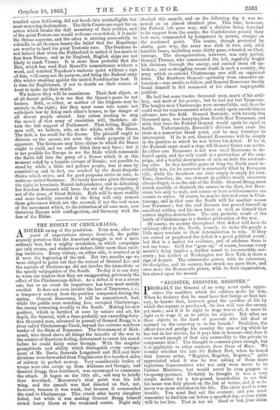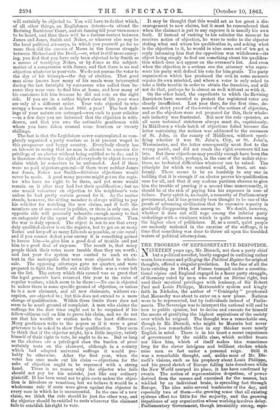"REGISTER, REGISTER, REGISTER." P ROBABLY the General of an army never
quite appre- ciates the sacrifices which his soldiers make for him. When he declares that he must have that bridge or that bat- tery, he knows that, however great the sacrifice of life by which the capture is purchased, its loss will cost the enemy yet more ; and if it be right to wage war at all, it must be right so to wage it as to attain its objects. But what are those objects to the herd of peasants who fall dead or maimed on the causeway or in the breach ? Doubtless, the officer does not grudge his country the arm or leg which he has lost in her service, for it pays him in honour—but does it ever award enough of that airy commodity to the private to compensate him ? The thought is common-place enough, but it is applicable to other contests than those of Mars. We wonder whether the lute Sir Robert Peel, when he issued that famous order, " Register, Register, Register," quite appreciated what it was he was asking of those mute inglorious Conservatives who not only were never to be Cabinet Ministers, but would never be even gaugers or twopenny-postmen. Probably he thought it was a very simple matter for a ten-pound householder to see that his name was duly placed on the list of voters, and if so ho never was more mistaken in his life. The claim itself is some trouble. You must find out the overseer, and you must remember to find him out before a specified day, or your claim will be too late. That is not all. Good or bad, your claim
will certainly be objected to. You will have to do that which, of all other things, an Englishman detests—to attend the Revising Barristers' Court, and sit fuming till your turn comes to be heard, and then there will be a furious contest between James and Jones, Smith and Nokes, or whoever else may be the local political attorneys, in which you yourself go for no more than did the carcase of Moses in the famous struggle between Michael and the Devil,—or, what is still more annoy- ing, you find that you have only been objected to by Smith as a means of terrifying Nokes, or by Jones as the subject- matter of a compromise with James, and that there is no real objection whatever to your vote. We do not pursue the voter to the day of his triumph—the day of election. That good man alone knows how many of his meals were interrupted during the last fortnight by canvassers who called then be- cause they were sure to find him at home, and how many of his customers left him because he did not vote on the right side. If you are in a rather higher class of life your woes are only of a different order. Your vote objected to who occupy a house worth at least 1001. a year ! The best feel- ings of your nature are outraged—you rush to your solicitor —in a few days you arc informed that the objection is with- drawn, and that you owe the estimable gentleman with whom you have taken counsel some fourteen or twenty Millings.
The fact is that the Legislature never contemplated so com- pletely organized a party warfare as is at present waged in this prosperous and happy country. Everybody clearly has an interest in seeing that no man is allowed to exercise the privilege of an elector without being entitled so to do ; and it is therefore obviously the right of everybody to object to every claim which he conceives to be unfounded. And if there were no paid objectors-general—if there were neither James nor Jones, Nokes nor Smith—frivolous objections would never be made. A good many persons might get on the regis- ter who have no right to be there, and yet more would remain on it after they had lost their qualification ; but no one would volunteer an objection to his neighbour's vote unless he had pretty certain ground for it. As the matter stands, however, the sitting member is always willing to pay his solicitor for watching the new claims, and if both the members are of one colour in politics, or there is only one, the opposite side will generally subscribe enough money to find an antagonist for the agent of their representatives. Then the war is duly opened. The object is not to see that every duly qualified elector is on the register, but to get on as many Tories and keep off as many Liberals as possible, or vice vermi ; and if you cannot defeat your enemy it is something gained to harass him—to give him a good deal of trouble and put him to a good deal of expense. The result is, that many people think their votes more trouble than they are worth ; and last year the system was carried to such an ex- tent in the metropolis that votes were objected to whole- sale. The opposing attorneys gave no quarter, and were prepared to fight the battle out while there was a voter left on the list. The outcry which this caused was so great that the legal generals have returned this year to the rules of regular warfare, which seem to be these :—No one is objected to unless there is some specific ground of objection, or unless he is a new claimant, and all new claimants, without ex- ception, are objected to ; but this does not extend to a mere change of qualification. Within these limits there does not seem to be much ground of complaint. A man who claims the suffrage for the first time ought not to be surprised if his fellow-citizens call on him to prove his claim, and we do not see that his wealth or station make the least difference. Many gentlemen write to the papers as if it were a great grievance to be asked to show their qualification. They seem to think that if the objector might, by a little inquiry, satisfy himself of their right to vote, he ought to do so. But so long as the electors are a privileged class the burden of proof certainly rests on the claimant, although in a country which had adopted universal suffrage it would pro- bably be otherwise. After the first year, when the voter has once made out his claim — objections for the sake of objection ought to be repressed with a strong hand. There is no reason why the objector who fails should not pay for his mistake, just like any ordinary plaintiff. It has been usual not to give costs unless the objec- tion is frivolous or vexatious, but we believe it would be a wholesome rule if costs were given against the objector in every case in which he is unsuccessful. In the case of a new claim, we think the rule should be just the other way, and the objector should be entitled to costs wherever the claimant fails to establish his right to vote.
It may be thought that this would act as too great a dis- couragement to new claims, but it must be remembered that when the claimant is put to any expense it is usually his own fault. If instead of rushing to his solicitor the moment he receives notice of objection, he were to write to the objector stating what and where his qualification is, and asking what is the objection to it, he would in nine cases out of ten get a reply informing him that the opposition was withdrawn—its object being simply to find out something about his qualifica- tion which does not appear on the overseer's list. And even when the objection is a serious one the attorney who repre- sents his party will defend his vote for him gratis. The party organization which has produced the evil in some measure repairs its own mischief, and where a voter is only asked to- take a little trouble in order to obtain the franchise, and will not do that, perhaps he is almost as well without as with it,
On the other hand, the expedients to which the Revising Barristers have resorted to protect the registered voter are clearly insufficient. Last year they, for the first time, de- manded strict proof of the service of the notices of objection,. and as the objectors were not prepared for this,, their whole- sale industry was frustrated. But now the rule operates, as all mere technical strictness always must do, capriciously, In Middlesex a whole batch of objections failed because the letter containing the notices was addressed to the overseers- of St. John, in the county of Middlesex, without speci- fying whether it was St. John's, City, or St. John's,. Westminster, and the letter consequently went first to the wrong parish, and did not reach the right overseers till too- late. But these objections may possibly enough have been the fairest of all, while, perhaps, in the case of the unfair objec- tions, no technical difficulties whatever can be raised. The principle for which we contend would, at least, act uni- formly. There seems to be no hardship to any one in holding that it is enough if an elector proves his qualification once for all, and that if any zealous partizan chooses to give him the trouble of proving it a second time unnecessarily, it should be at the risk of paying him his expenses in case of failure. Party spirit is, no doubt, a necessity of Parliamentary government, but it has generally been thought to be one of the proofs of advancing civilization that its excessive asperity is. graduallydisappearing from among us. We doubt, however, whether it does not still rage among the inferior party underlings with a virulence which is quite unknown among the higher class of politicians. If, as a result, quiet people are uselessly molested in the exercise of the suffrage, it is time that something was done to throw oil upon the troubled. waters of political attorneydom.































 Previous page
Previous page